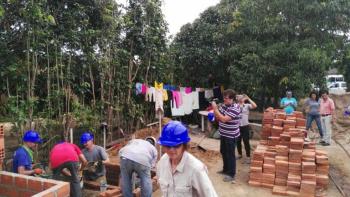HABITAT FACTS:
- Habitat began working in Bolivia in 1985.
- Individuals served in FY2021 – 2,415
- Through new constructions – 115
- Through repairs – 2,300
- Volunteers hosted in FY2021 – 202
COUNTRY FACTS:
Capital city -- Sucre
Population – 11.67 million
Life expectancy -- 71 years
Unemployment rate – 5.6%
Below poverty line – 12,9%
The housing need in Bolivia
Bolivia, similar to its neighbors in the region, continues to experience rapid urbanization with the most vulnerable families settling in peri-urban areas in precarious housing conditions. More than 67% of the population lives in urban areas, concentrated primarily in the metropolitan center. It is estimated that 80% of the population will be urban by 2030.
According to the National Institute of Statistics data, the qualitative shortage is characterized by severe overcrowding, experienced by approximately 30% of the families. In 24% of cases, three or more people sleep in a single room and an estimated 31% of the population has inadequate living conditions.
How Habitat addresses the need
Advocacy
We promote regulatory and/or procedural changes that facilitate access to decent housing through close cooperation with the Housing and Habitat Vice Ministry, and in partnering with civil society organizations and grassroots organizations. We are part of the National Network of Human Settlements, the Popular Habitat Committee, the Coordinator of Canadian Civil Society Organizations in Bolivia, the Consortium of Humanitarian Agencies in Bolivia, and the Habitat International Coalition, among others. We also advocate in the market systems through institutional technical assistance.
Housing assistance services
We provide technical assistance for the self-construction of new homes, repairs, improvements, and rehabilitations, according to the needs of each family. We also strengthen peri-urban communities to improve their participation in local planning, access to basic services, and the management of public spaces.
Since 2020, we initiated specific water, sanitation, and hygiene or WASH projects in response to the COVID-19 pandemic and the needs of vulnerable families, so that they can have safe housing with a bathroom, kitchen, laundry area, and access to drinking water.
Considering that the construction sector is vital for post-COVID-19 economic recovery, we trained and supported women construction workers to strengthen their technical skills in plumbing, electricity, and painting, and thus improve their employability.
Volunteerism
With the mobilization of institutional, national, and international volunteers, solidarity crosses borders. This is reflected in the selfless help provided by the building brigades, each ranging from eight to 20 people who travel to Bolivia and collaborate in constructing homes for one or two weeks or just a few days. Amid the pandemic, the virtual volunteering modality has been developed, particularly for the Bolivia Con Agua campaign (www.boliviaconagua.org.bo).
What you can do
DONATE
Donate at http://habitatbolivia.org/donar-ahora/
VOLUNTEER
The Global Village program was suspended in 2020 due to the COVID-19 pandemic. Please go to habitat.org/gv for updates, including when and where the program will resume.
TITHE
Habitat affiliates in the U.S. can establish a tithe partnership to help build houses, improve and/or enlarge homes, as well as ensure right of ownership and access to water and sanitation services. Write BOLIVIA on checks sent to: Habitat for Humanity International, Attn: Affiliate Tithe, 322 West Lamar St., Americus, GA 31709
CONTACT
Habitat for Humanity Bolivia, address: Av. Los Sauces #405, esquina Kantutas, zona Calacoto, phone: +591-2-2917557, www.habitatbolivia.org, [email protected].
.
